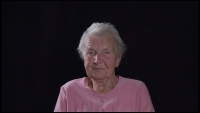In every evil man, a spark of good may appear
Marie Kozubíková, née Šafaříková, was born on the 20th of September of 1932 in Valašská Polanka. During the war, the Šafařík had to lodge German soldiers. In April 1945, members of the SS commando Josef replaced the army. This group was already responsible for the deaths of people of Ploština, Prlov and Juřičkův mlýn. The Šafaříks had no idea about this. They learned some sparse information from Marian, a Polish cook who travelled with the SS-men and knew a bit of Czech and this way, they found out about the horrors. On the 2th May of 1945, they learned from the cook that the Nazis are going to burn out some place. So far, they did not know where and why but after the return of Jagdkommando, everything was clear. Behind the fence, the arrested inhabitants of Vařákovy paseky stood. The Nazis started to interrogate them harshly and when they did not find out from the villagers what they wanted to, they issued the sentence. The next day, everyone including women and children were to be hanged on the trees by the road, as a warning to everyone. The vicarage housekeeper, Aurelie Ludwigová and the priest, Jan Absolon, persuaded the Nazis to let the women and children go. After the liberation, the Šafařík family lived a peaceful life into which the Communist coup d’état burst. For the Christian family with an estate, the future held only problems. First and foremost, there was a strong pressure to give up the estate to join the Unified Agricultural Cooperative and unreasonably rising production quota. During the 1950’s, Marie met her future husband, Zdeněk Kozubík who had served his jail sentence in the harsh prison in Uherské Hradiště for an alleged distribution of illegal flyers. Despite all the vicissitudes of that time and the ruling regime, the Kozubík family managed to raise six children without forfeiting their morals and faith. She died on February 24, 2023.
